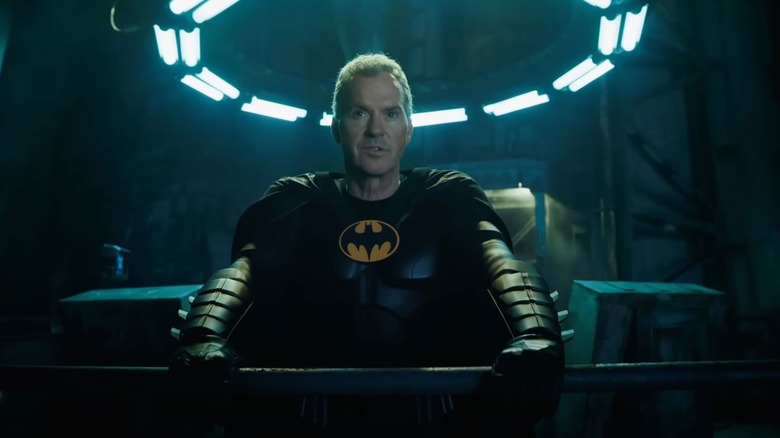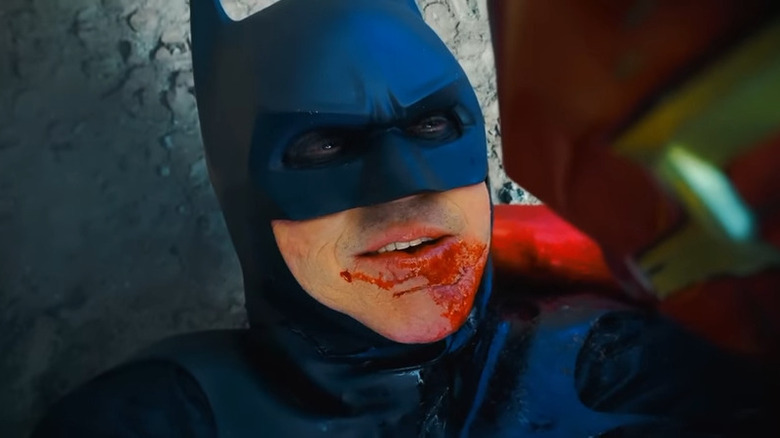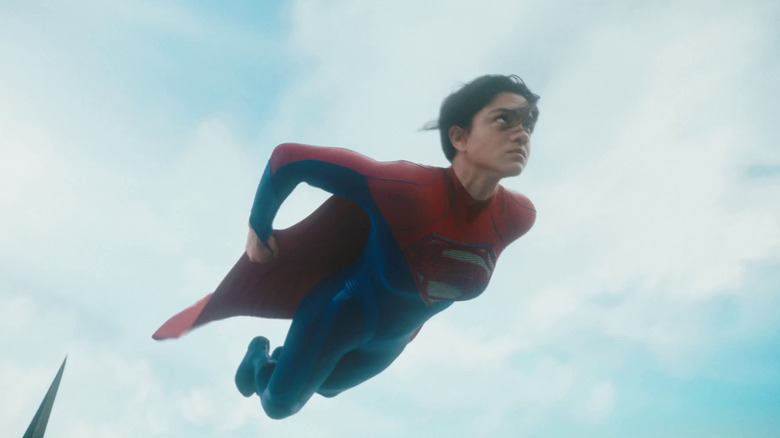Tim Burton Isn't Happy About How The Flash Used Batman And Superman
Andy Muschietti's recent superhero flick "The Flash" hoped to lure in audiences with a sprawling story that spans several parallel universes. It was the same approach taken by John Watts in "Spider-Man: No Way Home" and Sam Raimi in "Doctor Strange in the Multiverse of Madness," in that all three films assembled multiple versions of certain superhero characters culled from various extant movie franchises. "The Flash" contains the Ben Affleck version of Batman as he appeared in Zack Snyder's "Batman v Superman: Dawn of Justice," as well as the Michael Keaton version of Batman as he appeared in Tim Burton's 1989 film called merely "Batman." The Flash, he finds, can run so fast that he can travel into alternate timelines.
In the film's climactic final scenes, the Flash — having time-traveled too much — unwittingly causes the fabric of reality to rip, allowing cameo appearances from a dozen other Batmen and Supermen from across their respective franchise histories. In a montage, audiences see Superman as he was played by George Reeves and Christopher Reeve, as well as Supergirl as she was played by Helen Slater. In a surprising twist, there is a Superman made to look like Nicolas Cage, extrapolated from the unmade Tim Burton film "Superman Lives." There is also an Adam West Batman for good measure. Note that all the actors in this montage were visualized through CGI.
Since Burton had a hand in creating the Keaton Batman and the Cage Superman, the characters came up in an interview with the British Film Institute. Burton, it seems, isn't impressed with a lot of modern studio filmmaking, seeing only the grinding artificiality of the corporate machine at work.
Quiet revolt
Lou Thomas, the BFI interviewer, asked Burton about the notorious cancelation of "Superman Lives" back in 1998, a major studio production that was nixed mere weeks before shooting was to begin (see Jon Schnepp's 2015 documentary "The Death of 'Superman Lives': What Happened?" for the full story). Burton said he has "no regrets," as he was able to creatively devote himself to the project for an extended period and was proud of what he created. "It's one of those experiences that never leaves you, a little bit," he said.
But the politics over the "Superman" cancelation got Burton thinking about the modern studio marketplace, the WGA strike, and the increasing corporate impulses away from originality and toward automated homogeneity. He said:
"[I]t goes into another AI thing, and this is why I think I'm over it with the studio. They can take what you did, 'Batman' or whatever, and culturally misappropriate it, or whatever you want to call it. Even though you're a slave of Disney or Warner Brothers, they can do whatever they want. So in my latter years of life, I'm in quiet revolt against all this."
Burton's last movie, "Dumbo," was indeed a Disney product, but one can see some aggressive anti-Disney imagery in it. Michael Keaton plays a conniving entertainment bigwig — very similar to Walt Disney — who has commodified "dreams" in a Disneyland-like theme park. The film's climax involved the Walt Disney character trying to shoot a flying Dumbo using a weapon that looks like the Death Star ("Dumbo" was made after the Disney/Lucasfilm acquisition). In the process, he destroys Disneyland. Disney using "Star Wars" to destroy Disneyland while an icon from the company's Golden Age flies free is a pretty potent series of symbols.
Re-staked vampire
Point being, Burton has become disillusioned with the studios that have distributed most of his movies; either Disney or Warner Bros. has distributed all of Burton's films except for "Edward Scissorhands," "Big Fish, "Big Eyes," and "Miss Peregrine's Home for Peculiar Children." Burton, being such an iconoclastic and stylish director, has always seemed like an unlikely figure to have helmed so many blockbusters. Many of his films are aggressively idiosyncratic, and his popularity feels like an aberration.
It may not be a surprise to learn that he's had a lot of studio pushback in the past. After "Batman Returns" in 1992, for instance, he was disinvited from making a third Batman film. It seems that "Returns" was a little too kinky, strange, and off-putting for Warner's corporate mandates. When asked why he never made a third "Batman," Burton noted, "[Warner Bros.] had enough of me for that one. I think I upset McDonald's or something." A salacious movie like "Batman Returns" didn't sell enough fast food toys, it seems.
Something similar happened to Burton right at the beginning of his career. After making the short films "Vincent" and "Frankenweenie" for Disney, Burton was fired for, to put it bluntly, being too weird. Burton himself confirmed this, saying:
"I did 'Vincent,' and I did 'Frankenweenie' [at Disney], and yes, they did not renew my — I didn't have a contract. [But] that's when I went to Warner Brothers and did 'Pee-wee's Big Adventure.' So, without them saying that, yes. That was the final nail in my coffin at that point. My coffin was unearthed years later, and then I was then re-staked, and put back in. I'm like a vampire. I've been killed and resuscitated many times."
Burton's next film is "Beetlejuice 2" for Warner Bros.


